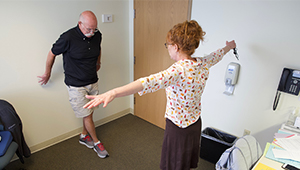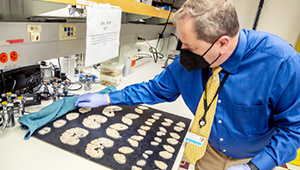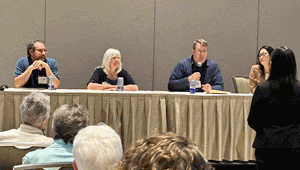Personalized coaching shows promise for delaying memory loss

New trial is the first to test an individualized approach to improve dementia risk factors
A new study led by researchers at University of California San Francisco (UCSF) and Kaiser Permanente Washington Health Research Institute (KPWHRI) has found that personalized coaching targeting dementia risk factors can delay or even prevent memory loss for higher-risk older adults.
The 2-year study compared cognitive scores, risk factors, and quality of life among 172 participants. Half of the participants were randomized to receive personalized coaching to help them improve their health and lifestyle in areas believed to raise the risk of Alzheimer’s disease, such as uncontrolled diabetes and physical inactivity. These participants experienced a modest boost in cognitive scores over the course of the intervention, amounting to a 74% improvement over the non-intervention group.
Participants who received coaching also did substantially better at improving their risk factors and reported modestly better quality of life compared to the group that did not receive coaching, the researchers reported. The study was published in JAMA Internal Medicine.
Older adults highly motivated to make changes
The study, known as SMARRT, for Systematic Multi-domain Alzheimer’s Risk Reduction Trial, follows previous work from other researchers that has yielded contradictory results on the effects of health and lifestyle interventions. This study was the first to provide personal coaching that was customized to participants, where each participant chose the areas they most wanted to work on.
“This is the first personalized intervention, focusing on multiple areas of cognition, in which risk factor targets are based on a participant’s risk profile, preferences, and priorities, which we think may be more effective than a one-size-fits-all approach,” said first author and lead investigator Kristine Yaffe, MD, vice chair of research in psychiatry and professor in the UCSF departments of neurology, psychiatry, and epidemiology and biostatistics.
“In an earlier survey of 600 older adults, we found that most were concerned about Alzheimer’s disease and related dementias. They wanted to know their personal risk factors and were highly motivated to make lifestyle changes to lower dementia risk,” said Yaffe, referring to her collaboration with co-lead investigator and coauthor Eric Larson, MD, MPH, former vice president for research and health care intervention at Kaiser Permanente Washington.
Participants in the study were enrolled in Kaiser Permanente Washington and were between 70 and 89 years old. They had at least 2 of the following risk factors for dementia: physical inactivity, uncontrolled hypertension, uncontrolled diabetes, poor sleep, use of prescription medications associated with risk of cognitive decline, high depressive symptoms, social isolation, and smoking.
“Up to 40% of the risk of Alzheimer’s disease and related dementias is believed to be preventable,” said Sascha Dublin, MD, PhD, coauthor on the study and a senior investigator at KPWHRI. “But very little is known about what works to help older adults make changes to these risk factors. The results we saw are very promising and suggest that personalized coaching could have a real impact on the health of older adults who are at increased risk for memory loss.”
The intervention participants met with a nurse and health coach and chose specific risk factors they wanted to address. They received coaching sessions every few months to review their goals, which ranged from walking a certain number of steps per day or signing up for a class to tracking their home blood pressure. The most common area participants chose to work on was increasing their physical activity. The coaching meetings started in person and switched to phone calls during the pandemic.
Non-intervention participants were similar in age, risk factors, and cognitive scores and received educational material, mailed every 3 months, on dementia risk reduction.
Pandemic did not offset study’s positive effects
“We were pleasantly surprised that the positive results of the trial were not offset by the impact of the pandemic,” said Larson, who is currently professor of medicine at University of Washington. “We know that isolation from social distancing took a heavy toll on cognition, social lives, and mental and physical health in some older adults. But participants in the intervention group fared better cognitively and had fewer risk factors after the trial, during the pandemic, than the group who did not receive health coaching.”
Unlike the new anti-amyloid medications for Alzheimer’s disease, risk-reduction programs are not costly, nor do they have strict eligibility criteria or require extensive monitoring for dangerous side effects, said Yaffe, who is also affiliated with the San Francisco VA Health Care System and the UCSF Weill Institute for Neurosciences.
“Hopefully in the future, treatment of Alzheimer’s and related dementias will be like cardiovascular disease management, with a combination of risk reduction and specific drugs targeted for disease mechanisms,” she said.
This study was funded by the National Institute on Aging.
Additional KPWHRI coauthors on this study are Lynn Fleckenstein, MA; Dori Rosenberg, PhD, MPH; and Benjamin Balderson, PhD. Other collaborators include Eric Vittinghoff, PhD (UCSF); Deborah Barnes, PhD, MPH (UCSF); and Carrie Peltz, PhD (San Francisco VA Health Care System).
This has been adapted from a news story by Suzanne Leigh at the University of California San Francisco.
New funding

Grant of over $55M to boost Alzheimer’s, dementia study
Kaiser Permanente Washington will co-lead an expanded ACT Program to better understand the aging brain.
News

New open data to help understand Alzheimer’s
Cell by cell, scientists are building a high-resolution map of brain changes in Alzheimer’s disease.
2023 ACT Symposium

Researchers gather to address critical topics in aging and dementia
The ACT Research Symposium returns with an in-person scientific forum.


